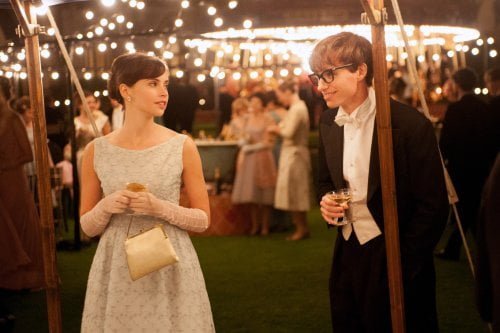The Theory of Everything

Stephen Hawking is an intellectual icon known the world over. There has been a plethora of films and TV specials about the man for decades and his book, A Brief History of Time (1988), has been read by millions in many languages. Eddie Redmayne portrays the life of the brilliant man in “The Theory of Everything.”
Laura's Review: A-
In 1963, Stephen Hawking (Eddie Redmayne, "Les Misérables") was a remarkable cosmology student at Cambridge University who fell in love with arts major Jane (Felicity Jones, "The Invisible Woman"). When he got the devastating news that he had neuron motor disease with a life expectancy of two years, he tried to make her go but Jane stood by him as he continued to work for decades on finding "The Theory of Everything." In adapting Jane Hawking's "Travelling to Infinity: My Life with Stephen" (screenplay by Anthony McCarten), director James Marsh's ("Man on Wire," "Shadow Dancer") second feature is an unusually personal look at one of the great minds of science. Eddie Redmayne's captivating performance will be compared to Daniel Day Lewis's achievement in "My Left Foot," but it is important to note how much life, joy and humor he brings to the role with little more than a cocked eyebrow, a few facial muscles and his eyes (a scene where he gets his head caught in a sweater when Jane leaves the room is delightfully relatable). Aided by costume design (Steven Noble), Redmayne gradually fails, visibly shriveling into his wheelchair, but although there are inevitable frustrations, his handicap is balanced with the normalcy of being husband and father, right down to horseplay with his kids. As his wife, Jones is also strong, a determined woman eventually worn down by the demands of her situation. Here is a movie that exhibits how it is quite possible to love someone, yet turn to another for romantic renewal, a move made by both partners of the Hawking marriage. The film is bookended by Hawking's visit to Buckingham Palace to receive an honor from the Queen, but its relational import isn't realized until film's end. In between we see how Hawking, supported by advisor Dennis Sciama (David Thewlis, "Harry Potter's" Remus Lupin), came into prominence in his field by expanding upon Roger Penrose's black hole theory of singularity to the entire universe (and unlike "Interstellar," Hawking's theories are presented in easy to understand language). Children arrive into the home of a not particularly prosperous academic, whose wife struggles to continue her studies along with everything else. Her devout faith, a point of contention with her husband's work, and a need for an outlet lead her to her Church choir (at the suggestion of her mother, Beryl, played by Emily Watson). There she meets widower Jonathan Hellyer Jones (Charlie Cox, HBO's 'Boardwalk Empire'), whose genuine desire to help quickly turns him into a third partner. As Hawking's condition worsens, leaving him reliant on an arduous tool in order to communicate, Elaine Mason (Maxine Peake, UK TV's 'Shameless') enters the picture. Bawdy and possessive, Elaine ignites a spark in Stephen. The film is lushly photographed by Benoît Delhomme ("Lawless," "A Most Wanted Man"), reveling in the romanticism of Cambridge's May Ball and the cool verdancy of the English countryside. Production locations include Cambridge University grounds, the Royal Opera House (standing in for Geneva's) and Cavendish laboratory, where the atom was first split. Art direction and costume design are impeccable, all lending to a strong sense of time and place. Grade:
Robin's Review: DNS
DNS

